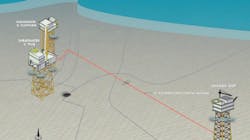North Sea Jackdaw project goes ahead following Shell revisions
Offshore staff
ABERDEEN, U.K. — Shell has received government approval for its revised plan to develop the HP/HT Jackdaw gas-condensate field in the U.K. central North Sea.
The company reportedly plans to invest £500 million in the project, with production set to start in the second half of 2025.
Last year the North Sea Transition Authority (NSTA) rejected Shell’s initial plan, calling for a tieback of Jackdaw to its offshore Shearwater processing hub. The NSTA favored Harbour Energy’s Judy platform as the host for environmental reasons.
Shell reportedly saw no gains in terms of reducing emissions by going the Judy route, claiming longer-term benefits in tying production back to Shearwater.
Global developments this year have forced the government to backtrack on restrictions on new North Sea field development to safeguard the U.K.’s energy supplies.
Jackdaw, discovered in 2005 by BG International (now part of Shell), extends across three blocks in a water depth of ~78 m. The field is 30 km southeast of the Shearwater platform and next to the U.K./Norway median line.
Shell’s revised plan, submitted in February this year, calls for a "not permanently attended" wellhead platform with four wells, connected by a 31-km subsea pipeline to the Shearwater hub, where the gas will be processed and exported to the terminal at St Fergus, north of Aberdeen.
At its peak, the field should account for 6.5% of U.K. gas production, Shell’s statement said, and less than 1% of U.K. Continental Shelf emissions. In the context of U.K. climate targets, Jackdaw emissions (2028 to 2032) are said to constitute 0.013% of the Fifth Carbon Budget over the same period.
Shell adds that at least 70% of the project value would be achieved through processing via the Shearwater hub and the associated gas-condensate processing system at St Fergus and Mossmorran to the south (as opposed to condensate being blended with crude oil). No other processing hub would offer this value, the company claims.
Jackdaw’s development also affords Shell time to mature its plans for electrification of the Shearwater hub, as part of as regional program. This could cut the overall Shearwater hub emissions footprint by 60% to 65%, as most of its emissions are caused by combustion of fuel gas for power generation and compression.
Additionally, the Acorn carbon capture and storage (CCS) project based at St Fergus, in which Shell is participating, should create a CCS/hydrogen low-carbon energy hub, with potential to capture from the late 2020s CO2 from Jackdaw and Shearwater.
Shell also is considering pre-combustion capture of reservoir CO2 from the gas streams through the gas pipelines landing at St Fergus. This could allow all the CO2 within the Jackdaw gas stream (and from other fields landed at St Fergus), to be captured, treated and transported for offshore storage. In Jackdaw’s case, the estimated reduction is ~10 kt/yr.
06.06.2022
